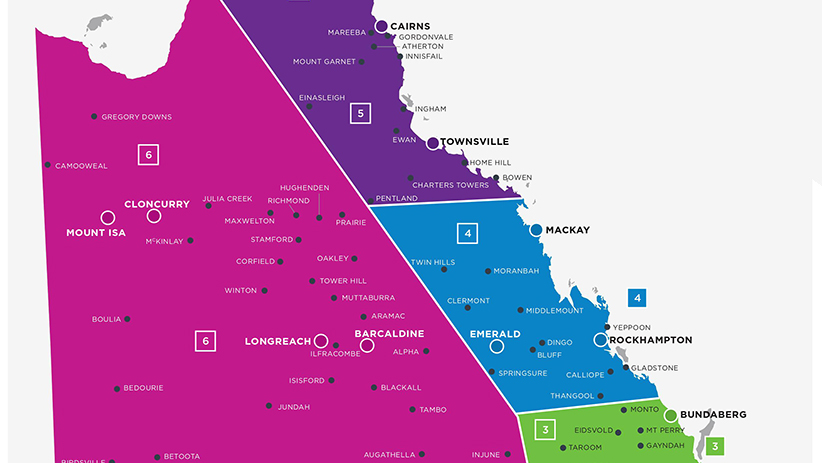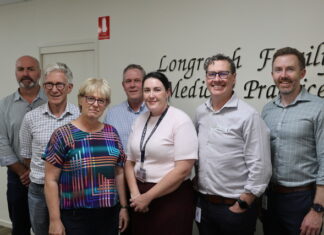It has been an evolving environment over the past month with Racing Queensland (RQ) trying to keep abreast of protocols. Sunday saw the introduction of a new Greater Western Zone, causing reconfigurations in racing right across Central Queensland.
The new zone encompasses the whole of the Western Queensland corridor, aligning with the Local Government Western Alliance. Trainers and jockeys within this zone can race freely from Mt Isa to Roma. All areas are, to date, Coronavirus free.
The lack of local race meets within central western Queensland has been felt by the local racing fraternity and wider community, and no doubt the changes have caused confusion and angst among local industry members.
Longreach Jockey Club president Rob Luck has been one of the key local racing representatives pushing for meets to return to the west.
“Hats off to RQ for the hard work that has been done to keep our whole industry going during this time”, Luck said.
“With all the uncertainty, Longreach and many other western clubs had to make the tough decision to say no to racing in the best interests for our communities at the time. But now, with changing circumstances, Longreach is happy to run race meets again.”
Negotiations and planning has enabled the club and RQ to get racing back onto dirt tracks.
“Our goal is to reboot racing in the west”, Luck said. “It’s taken a lot of work to get approval to resume, and it has been the Covid-19 containment within the whole of Western Queensland that has allowed us to get going again.”
On the advice and support from Queensland’s Chief HealthOfficer Dr Jeannette Young, the notion for the Western Queensland Zone was inresponse to restricting movement from the coast to inland communities.
“RQ has kept a strong alliance with health authorities andafter many conversations and soft pressure, a resolution was reached on how wecould make this work within our coronavirus-free area”, Luck said. “That iswhat got us over the line, the fact that we don’t move jockeys and horses fromeast to west.
“While the green light has been granted to race again inthe Central West, it is up to each community to run a meet. In Longreach’scase, the race track is owned by the club so we can give it the go-ahead.”
When the RQ announcement came last week, some trainers andjockeys were disappointed to learn the scheduled meeting at Emerald had to beabandoned due to re-zoning.
“Unfortunately the call was made close to Emerald’s meetwhich was hard for some who have prepped horses and allocated jockeys,” Lucksaid. “However they must appreciate a lot of work went on behind the scenes toallow us to run meets closer to home. The alternative would have been no racingin the Central West.”
Jockeys are the most affected by the new changes withprevious measures allowing them to ride in two zones. Now they can only selectone.
This has raised concerns surrounding jockey availability in the Central West, an issue that has always been faced by the industry. Bush racing relies heavily on jockeys who ride in multiple districts.
Central West racing officials are hoping a pool of jockeys will be attracted from the North West and South West to satisfy the local fields.
Barcaldine-based jockey Brooke Richardson has praised all efforts to maintain the nation’s third largest industry.
“I don’t think there would be one jockey who hasn’t beenstressed by the possibility of their livelihood coming to a halt overnight, butI feel blessed that the industry on my home turf and nation-wide has been soproactive,” Richardson said.
“RQ has gone above and beyond to keep jobs going. There areso many cogs in this big machine, from breeding and spelling farms, rightthrough to race tracks and stable operations. It’s such a massive process. Ifit were to shut overnight there would be huge repercussions for the Australianeconomy.”
Like many within the local racing community, Richardsonunderstands the recent changes come with pros and cons, but the changes aremainly a big win for country racing.
“I will be pleased to see everyone out here get theopportunity to keep racing horses in the west and in more suited company,”Richardson said.
“Some trainers were finding it difficult for their horsesto get a start in a race due to having to compete with provincial class horses.Hopefully the new zones will see our country class horses receiving the runsthey deserve, more frequent meets for our district trainers, and maybe somenormality returning to stable operations.”
Another welcomed “plus” for local stakeholders is that RQhas fixed Greater Western Zone prizemoney at the TAB price of $10,000 per racefor the non-TAB meetings.
As the west gears up for racing to recommence, stringentmeasures will be adopted to ensure the safety of all involved.
Country racing must adhere to strict protocols such asproviding competent security staff to ensure meets remain patron-free,monitoring that only essential people are on site, temperature checks on allkey personnel, strict handling and cleaning of saddlery and equipment, andjockey leg-ups.
“These measures have been put in place to protect ourregion,” Luck said. “Hopefully because of these changes, down the track we willbe able to ease the restrictions within our zone because the boundaries havebeen put in place to coincide with clean regions,” Luck said.
“It’s going to be a bit different seeing our race tracks likeghost towns, but it’s a vital step in getting racing back to normal.”
The new program is:May 3 Longreach; May 9 Mt Isa andCharleville; May 16 Barcaldine (TBA), if not, Longreach will take this date;May 23, Mt Isa; May 30, Longreach.
RQ will review biosecurity measures after May and reviseprogram if needed.








